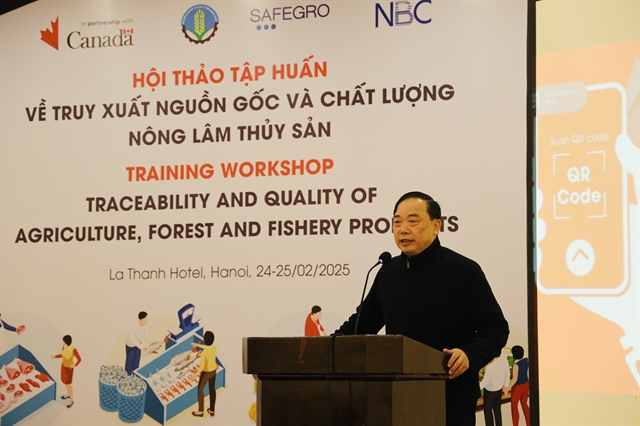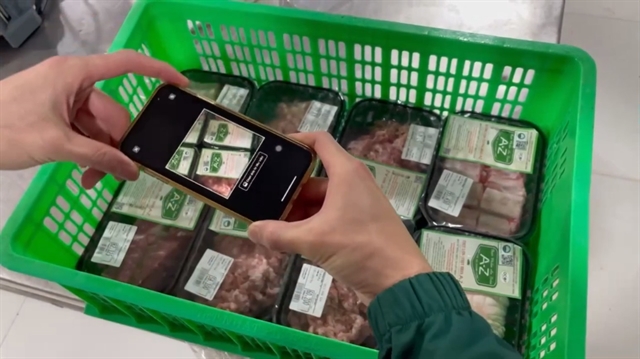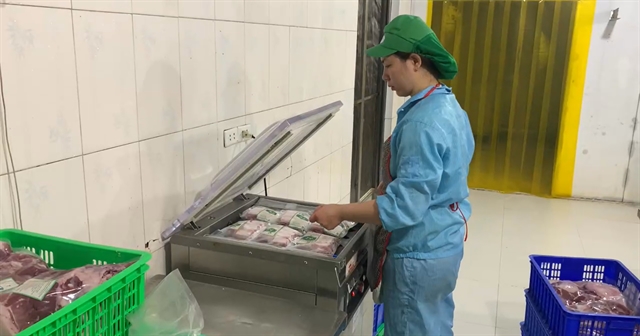 Society
Society

 |
| An employee at Hoàng Long cooperative scans the QR code on meat products after the production and packaging process has finished logging data into the digital traceability system. VNS Photos Anh Đức |
Anh Đức
A common saying goes: "You are what you eat."
The ancient phrase is proving to be more accurate in recent times, as scientific discoveries reveal the correlation between food consumption and health.
According to an estimate by the World Health Organization, 600 million people, which is about 7.5 per cent of the current world population, suffer from illnesses caused by food poisoning, with a further 420,000 dying of these illnesses annually.
A 2015 report by the WHO also stated that, unsafe food containing harmful bacteria, viruses, parasites or chemicals, can cause over 200 diseases, ranging from diarrhoea to chronic illnesses like cancer, which creates a vicious cycle of illness and malnutrition, especially affecting children and the elderly.
Examples include animal-based products that are not properly cooked, contaminated fruits and vegetables, along with shellfish containing biological toxins.
As consumers are increasingly aware of the importance of nutrients and contents in food products, more efforts are being made in controlling the origin of food to further ensure proper food sanitation and protection of health.
In the waves of digital transformation in Việt Nam, traditional co-operatives and tech firms banding together, with the help of the Safe Food for Growth (SAFEGRO) project and technical advice from National Barcode Center (NBC), to solve this crucial problem in food safety and pioneer to set up digital traceability platform.
Not settling for just standards
Tân Ước Commune of Thanh Oai District, around 30km outside Hà Nội, is famous for its villages that produce traditional pork sausages called giò chả.
Nowadays, traditional co-operatives such as Hoàng Long in Chi Lễ Village have transformed into modern food processing businesses, with a closed process from livestock breeding to butchering.
The director of the Hoàng Long livestock farming and slaughtering co-operative, Nguyễn Trọng Long, believes in investing towards facilities and safety measures to build customer trust for his co-operative's products.
A pioneer in his industry, Long's pig farm was the first to use a model called 'pig condo', which Long himself adopted from advanced countries. The idea was to build pig farms consisting of one to three-storey high buildings to conserve space, challenging the norms of pig farming.
Hoàng Long co-op also prides itself upon its closed process called 'A to Z farming', which they also put on their brand name and packaging.
The cooperative maintains high-standard facilities for pig farming, ensuring hygiene across all areas—from feed troughs to housing spaces—and employs a modern ozone disinfection system for effective disease prevention.
All of that effort ensured a spotless reputation for Hoàng Long – there have been no pig disease outbreaks from when Long started the business. But its director did not settle for just achieving the standards.
"Smaller businesses, cooperatives or local chains might struggle if they lack proper traceability from farming through slaughtering, processing, storage and transport," said Long.
"Without traceability, consumers can't confidently assess product quality. To reassure customers, it's crucial for producers to adopt clear traceability systems, demonstrating that their products are safe. This helps consumers feel secure about choosing their products," he added.
Hoàng Long co-operative, with assistance from the Canada-funded SAFEGRO project and NBC, is implementing the iCheck Trace application throughout its closed process.
iCheck Trace is a comprehensive digital traceability platform developed to enhance product transparency, build consumer trust and streamline management for enterprises in Việt Nam. Integrating advanced technologies such as blockchain, IoT and QR codes, iCheck Trace allows businesses to accurately trace and track their production processes from farming to final distribution.
Consumers can quickly verify product authenticity and origin by scanning QR labels, which provide detailed information on production logs, certifications, and supply chain records. The system complies with Việt Nam’s national standards (TCVN) and international GS1 specifications, ensuring credibility and facilitating easier access to global markets.
But the most convenient aspect of the application is its accessibility. As a smartphone application, iCheck Trace simplifies business operations, enabling remote management of production, inventory and logistics.
Hoàng Long is just one of two food processing co-operatives in Hà Nội utilising the iCheck Trace application with the help of SAFEGRO, along with the vegetable farm of Văn Đức Co-operative in Gia Lâm District.
Three other agricultural production businesses in the South including Phong Thuý enterprise, Cần Giờ fishery cooperative and Phú Lộc vegetable cooperative are implementing the FANVITY digital traceability system for their product traceability with same support from SAFEGRO and NBC.
 |
| Another employee of Hoàng Long putting the labels with the traceable QR codes onto the packaging. |
Crossing the digital barrier
A tall man with glasses, Nguyễn Hữu Khánh is the person who knows everything about data and computers at the co-operative, and he has implemented it fully into his day-to-day work at Hoàng Long.
"Manual record-keeping often leads to inconsistency. You might note something today, skip it tomorrow, or even completely forget. With software, however, reminders and alerts ensure tasks aren't overlooked. Instead of needing a manager to constantly prompt employees, the software itself handles that role.
"If something isn't completed, it's immediately noticeable, eliminating the need to manually check documents or paperwork. Even digital records on a computer require effort to open and verify. With software accessible via smartphones, checking and verifying information is quick and convenient for everyone," Khánh explained.
According to Khánh, iCheck is applied during the farming process where pigs are identified before going into the butcher process. The programme then creates QR codes for the employees to scan after the process of meat and packaging and two more times before and after the product is delivered to a supermarket.
"The customer then can scan the QR code on the packaging and know the exact detail of the origin of the product," said Khánh.
The process of using iCheck Trace seems simple: just open the app, scan the code and press some buttons. But as with all other digital transformation programmes, the challenges remain in educating workers and farmers in implementing technology applications.
"One of the biggest challenges we face is changing the mindset and habits of producers, especially among cooperative members. Firstly, they often hesitate to adopt new practices or change their familiar production routines. Secondly, many struggle, especially old workers, with using devices such as smartphones," said said Nguyễn Văn Chính, Deputy Managing Director of iCheck.
"To overcome these challenges, we've considered several solutions. Firstly, we actively promote awareness campaigns to help producers understand the importance of these changes. Secondly, we've intensified and extended our training programmes to provide more practical and ongoing support. Lastly, we're looking into deploying IoT devices, such as smart cameras and sensors, to automate monitoring and simplify data collection for traceability," Chính added.
A training programme for iCheck Trace was a crucial part of a workshop organised in Hà Nội in February, which gathered sixty food safety officials and delegates from trade associations across northern Việt Nam.
Checking out the future
“Ensuring food safety is a shared responsibility for all producers and consumers throughout the entire food supply chain, from farm to table,” said Jeffery Kobza, former WHO Representative in Việt Nam. “Producers, processors and food businesses in Việt Nam must take responsibility for the safety of the food they produce and sell, while consumers need to adopt preventive measures and follow good food safety practices.”
Projects such as SAFEGRO provided a bridge between small and medium enterprises such as Hoàng Long and tech companies such as iCheck, to implement an innovative and proper system to ensure food safety transparency across the supply chain, as Kobza has envisioned.
"Food traceability is more than just a ticket to survive on the market," said Long.
"Currently, products with clear origins require producers to follow strict standards, making them more expensive. Higher prices can make competing difficult because the market is flooded with cheaper, untraceable products, which are often visually appealing and seem acceptable. However, many consumers today, especially those from premium segments or cautious buyers, prefer products that can be traced and are safe.
"The number of such consumers is increasing, and thus, traceability benefits both producers and consumers. When products can be clearly traced, consumers feel confident and secure, and they're willing to pay higher prices," the director of Hoàng Long Co-op added.
As modern technology evolves, so does the awareness of the public on certain issues close to them, with food safety being one of the most talked about.
Food traceability seemed like a very complicated idea for many, but for Khánh, who outside his profession at Hoàng Long is also a father and a customer, is a simple but important aspect.
"For me, transparency in production is simply respecting the customer," said Khánh. VNS




